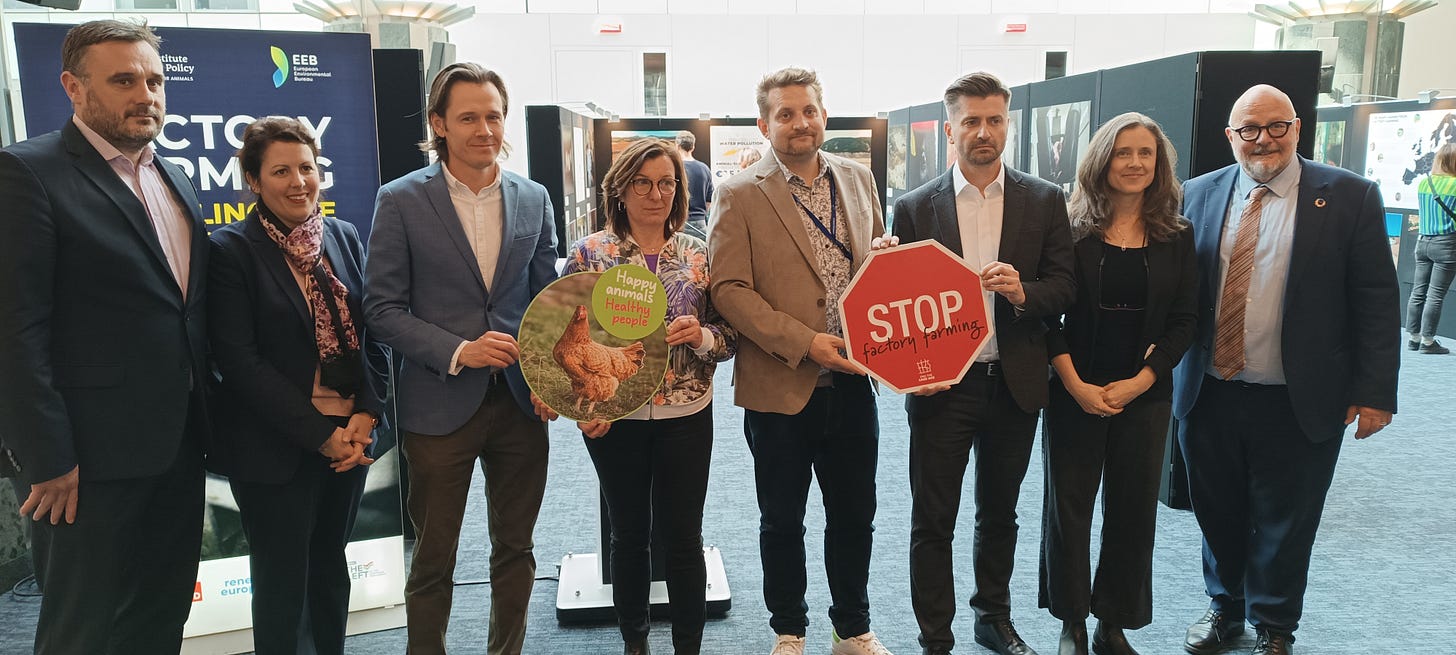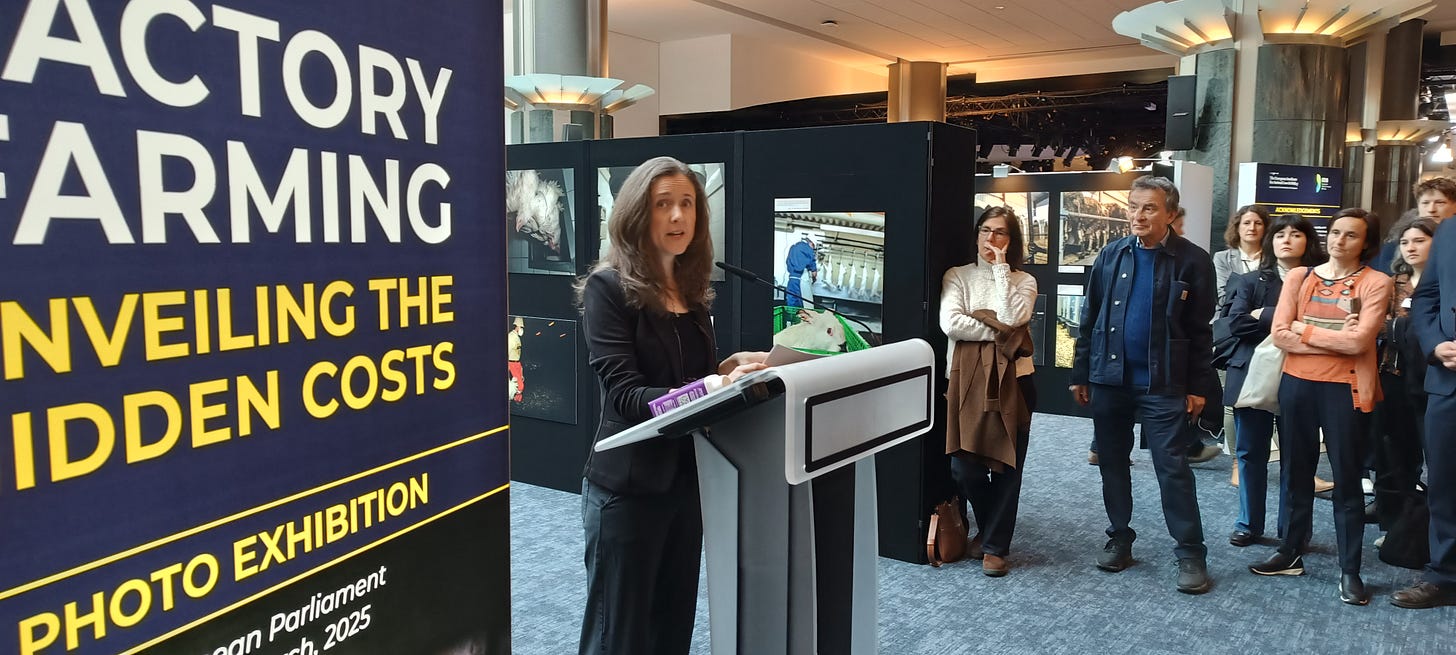Special Newsletter: “Factory Farming: Unveiling the Hidden Costs”
Our exhibition in the European Parliament
Dear subscribers and supporters,
This special edition of our newsletter provides an overview of our exhibition, “Factory Farming: Unveiling the Hidden Costs,” which took place at the European Parliament this week. This powerful collection of photography exposed policymakers and the public to the devastating impact of industrial farm animal agriculture.
In this edition of the newsletter:
Our Exhibition in the European Parliament
Media Appearances
Events
Calls for Contributions
Our Exhibition in the European Parliament
In collaboration with the European Environmental Bureau (EEB), we curated striking, unfiltered images that lay bare the cruelty, confinement, and suffering inflicted on billions of animals—while also revealing how factory farming devastates ecosystems, endangers public health, and fuels the climate crisis.
Backing our urgent call for change, Members of the European Parliament (MEPs) from across the political spectrum stood with us. Tilly Metz (Greens/EFA), Manuela Ripa (EPP), Krzysztof Śmiszek (S&D), Michal Wiezik (Renew), and Anja Hazekamp (GUE/NGL) co-hosted the event, while Marc Angel (S&D), Niels Fuglsang (S&D) and Sebastian Everding (GUE/NGL) joined and addressed the gathering. Together, they reinforced the need for the Commission to deliver a strategy that supports farmers in transitioning to a system that benefits them, the animals involved, neighboring communities, and nature.

Award-winning photojournalist Jo-Anne McArthur, who has dedicated her career to documenting the suffering of animals worldwide through the We Animals project, was the special guest speaker at the launch event on Tuesday. Her frontline stories moved many to tears and deepened admiration for her bravery and that of her 12 dedicated photographer colleagues at We Animals. “What the images show sharply contradicts what farming industries would have us believe: that the welfare of animals is just fine,” she told attendees in the Parliament.
The exhibition lasted three days, shining a light on the urgent need for change – spurring our work forward with renewed enthusiasm. We’ll continue to call on the Commission to:
Revise EU Animal Welfare Legislation: Improve farming conditions by reducing density, banning cages, and ending cruel practices like routine mutilation and force-feeding.
Develop an EU Action Plan for Plant-Based Food by 2026: Transitioning to more plant-based food and farming systems would have a profound and positive impact on animal welfare, climate change, public health, and more.
Develop a Livestock Strategy: Create a comprehensive strategy for the animal farming sector that supports positive farming practices and applies a territorial approach.
Rethink CAP Post-2027: Redirect subsidies from intensive animal rearing to support farmers delivering benefits for nature, animal welfare, and the climate.
Media Appearances
The exhibition received press coverage in key Brussels’ media, including The Brussels Times and POLITICO.
The Brussels Times article focused on the motivation behind the exhibition, quoting our very own Olga Kikou (Director of Advocacy and one of the organizers of the “End the Cage Age” European Citizens’ Initiative):
In factory farms, animals are turned into production machines. Being forced to live in high concentrations in unnatural social groups leads to behavioral problems and the spread of disease. Animals have no contact with the outdoors, are fed human-edible crops and are often sick. The physiological and psychological issues stemming from these systems lead the industry to adopt 'quick fixes,' such as cages or mutilations.
POLITICO picked up on the fact that one of the images we had planned to display in the exhibition was deemed too much even for this subject matter. Polish MEP Kosma Złotowski, a senior official who approves internal events, flagged the image of a screaming, restrained piglet mid-castration as “exceptionally drastic.” The article explains:
‘In agreement with MEP Tilly Metz, the photo was replaced by another one sent by her office,’ Złotowski said in a written reply, citing rules against offensive or disruptive content. Metz told POLITICO she disagreed with the decision, but wasn’t surprised — saying that since last year’s EU election, which saw a surge of right-wing and populist lawmakers, even factual depictions of farming and climate issues have become politically sensitive.
Events
Alice Di Concetto (Chief Legal Advisor) will present the Institute's work at two events next week:
Roundtable – Theory, Wildlife, and the Law: Authors’ Roundtable, the Journal of International Wildlife Law and Policy and the Global Research Network, March 31st, online. Learn more.
Roundtable – Humane Slaughter of Aquatic Animals, Ethical Seafood Research and the Global Research Network, April 3rd, online. Learn more.
Workshop – 2025 Comparative Animal Law Postgraduate Workshop, Center for Animal Legal Studies at Lewis & Clark Law School (and others), April 8th – 9th, online. Learn more.
Calls for Contributions
The Animals, Nature & Society Research Stream (Centre for Human Rights, Birmingham City University) is calling for papers for the Animals, Nature & Society PhD Workshop, on the topic of “Building Connections and Interdisciplinary Pathways for Impactful Research.” The workshop will take place on June 3rd in Birmingham, UK. Deadline to apply: April 1st.








